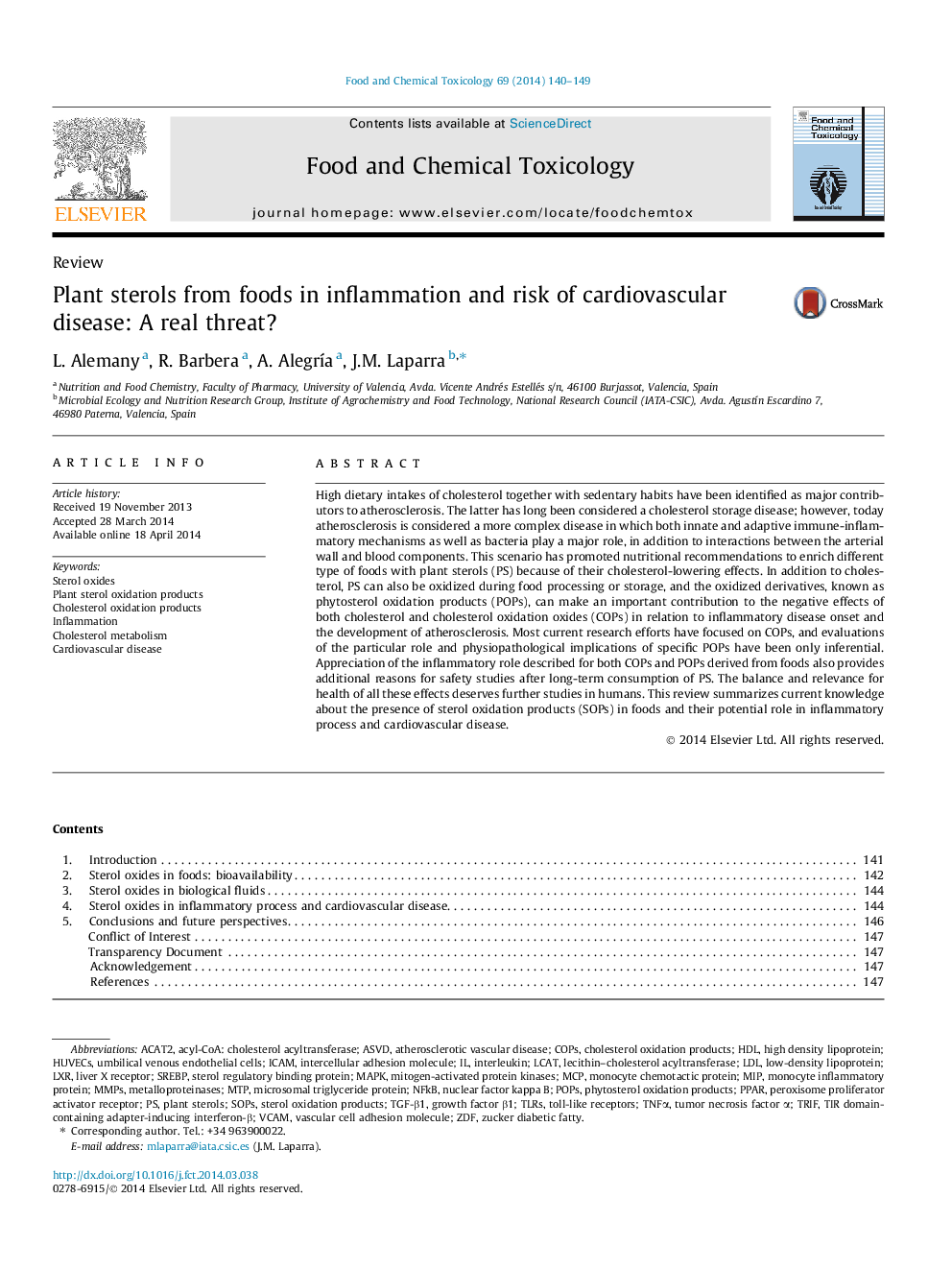| کد مقاله | کد نشریه | سال انتشار | مقاله انگلیسی | نسخه تمام متن |
|---|---|---|---|---|
| 5850232 | 1561775 | 2014 | 10 صفحه PDF | دانلود رایگان |
عنوان انگلیسی مقاله ISI
Plant sterols from foods in inflammation and risk of cardiovascular disease: A real threat?
ترجمه فارسی عنوان
استرول گیاهی از مواد غذایی در التهاب و خطر بیماری قلبی عروقی: یک تهدید واقعی؟
دانلود مقاله + سفارش ترجمه
دانلود مقاله ISI انگلیسی
رایگان برای ایرانیان
کلمات کلیدی
LCATNFkBVCAMICAMMTPLXRZDFSREBPPPARHUVECSACAT2Acyl-CoA: cholesterol acyltransferaseTNFαTGF-β1lecithin–cholesterol acyltransferaseMmpsMCPMIPCoPSHDLSOPsMAPK - MAPKTLRs - TLR هاTRIF - Trif بهPOPs - آلایندههای آلی دیرپاPlant sterols - استرول گیاهیinflammation - التهاب( توروم) interleukin - اینترلوکینAtherosclerotic vascular disease - بیماری آترواسکلروتیک عروقیcardiovascular disease - بیماری قلب و عروقیtumor necrosis factor α - تومور نکروز عامل αnuclear factor kappa B - فاکتور هسته ای کاپا Bhigh density lipoprotein - لیپوپروتئین با چگالی بالاLow-density lipoprotein - لیپوپروتئین کم چگالی یا الدیال LDL - لیپوپروتئین کم چگالی(کلسترول بد)Cholesterol metabolism - متابولیسم کلسترولMetalloproteinases - متالوپروتئینازهاsterol oxidation products - محصولات اکسیداسیون استرولPhytosterol oxidation products - محصولات اکسیداسیون فیتوسترولCholesterol oxidation products - محصولات اکسیداسیون کلسترولintercellular adhesion molecule - مولکول چسبندگی بین سلولیvascular cell adhesion molecule - مولکول چسبندگی سلولی عروقیmonocyte chemotactic protein - پروتئین chemotactic monocyteZucker Diabetic Fatty - چربی دیابتی Zuckerliver X receptor - کبد X گیرندهmitogen-activated protein kinases - کیناز پروتئین فعال MitogenToll-like receptors - گیرنده های پولی مانند
موضوعات مرتبط
علوم زیستی و بیوفناوری
علوم کشاورزی و بیولوژیک
دانش تغذیه
چکیده انگلیسی
High dietary intakes of cholesterol together with sedentary habits have been identified as major contributors to atherosclerosis. The latter has long been considered a cholesterol storage disease; however, today atherosclerosis is considered a more complex disease in which both innate and adaptive immune-inflammatory mechanisms as well as bacteria play a major role, in addition to interactions between the arterial wall and blood components. This scenario has promoted nutritional recommendations to enrich different type of foods with plant sterols (PS) because of their cholesterol-lowering effects. In addition to cholesterol, PS can also be oxidized during food processing or storage, and the oxidized derivatives, known as phytosterol oxidation products (POPs), can make an important contribution to the negative effects of both cholesterol and cholesterol oxidation oxides (COPs) in relation to inflammatory disease onset and the development of atherosclerosis. Most current research efforts have focused on COPs, and evaluations of the particular role and physiopathological implications of specific POPs have been only inferential. Appreciation of the inflammatory role described for both COPs and POPs derived from foods also provides additional reasons for safety studies after long-term consumption of PS. The balance and relevance for health of all these effects deserves further studies in humans. This review summarizes current knowledge about the presence of sterol oxidation products (SOPs) in foods and their potential role in inflammatory process and cardiovascular disease.
ناشر
Database: Elsevier - ScienceDirect (ساینس دایرکت)
Journal: Food and Chemical Toxicology - Volume 69, July 2014, Pages 140-149
Journal: Food and Chemical Toxicology - Volume 69, July 2014, Pages 140-149
نویسندگان
L. Alemany, R. Barbera, A. AlegrÃa, J.M. Laparra,
